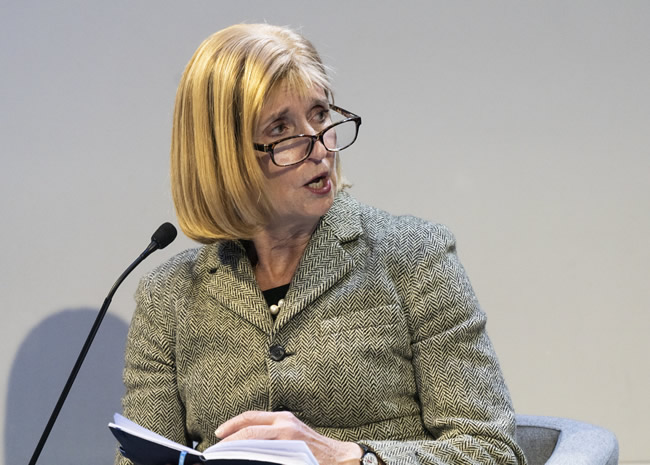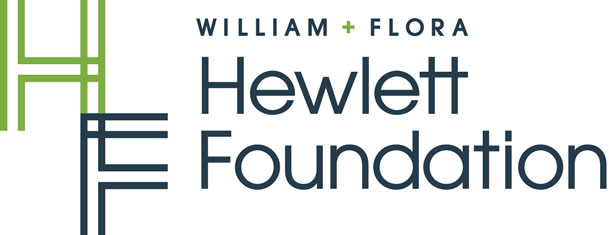« M. Jagadesh Kumar appointed University Grants Commission (UGC), India, Chairman | Main | Delhi University colleges Reopen. Students are back on campus after two years. »
February 17, 2022
Philanthropies Launch Effort to Establish Multidisciplinary Centers at Leading Academic Institutions Focused on Reimagining Capitalism, Economy, and Society to Address 21st Century Challenges
- First Grants from Hewlett Foundation and Omidyar Network to Harvard, Howard, Johns Hopkins Universities, MIT, and Santa Fe Institute; Ford and Open Society Foundations to Fund More Centers around the World Later in 2022.

Photo: Paula J. Dobriansky, Senior Fellow, Future of Diplomacy Project, Belfer Center for Science and International Affairs, Harvard Kennedy School of Government, USA speaking in The Great Indo-Pacific Race session at the World Economic Forum Annual Meeting 2020 in Davos-Klosters, Switzerland, January 22, 2020. Image credit & copyright © World Economic Forum/Faruk Pinjo.

MENLO PARK, Calif., Feb. 16, 2022 — Today, the William and Flora Hewlett Foundation and Omidyar Network announced more than $40 million in grants to support the establishment of multidisciplinary academic centers dedicated to reimagining the relationships among markets, governments, and people. When conventional economic prescriptions are failing, and democratic governance is getting threatened worldwide, scholars at leading academic institutions will investigate how economies should work in the 21st century and the aims they should serve.
The Hewlett Foundation will fund policy and research centers at Harvard Kennedy School, Howard University, Massachusetts Institute of Technology (MIT), and Johns Hopkins University.
The Ford Foundation is also committed to making additional grants to institutions in Africa, Asia, and Latin America, in 2022. In addition, the Open Society Foundations are exploring how to best support heterodox economic thinking through the Open Society University Network, a global partnership of educational institutions that integrates learning and the advancement of knowledge.
This announcement marks the beginning of a significant philanthropic effort to fund higher-educational institutions to help rethink and replace neoliberalism and its assumptions about the relationship between the economy and society. For more than 40 years, neoliberalism has dominated economic and political debates, both in the U.S. and globally. With its free-market fundamentalism and growth-at-all-costs approach to economic and social policy. Neoliberalism offers no solutions for the biggest challenges of our time, such as the climate crisis, systemic racism, and rampant wealth inequality — and in many ways, it has made those problems even worse. The new academic centers will contribute to the growing movement to articulate a better approach to political economy and find systemic solutions that build a more equitable and resilient society based on a new set of economic values. Hewlett Foundation explained.
“Neoliberalism’s anti-government, free-market fundamentalism is not suited for today’s economy and society. But what comes next is still not fully developed,” said Larry Kramer, president of the William and Flora Hewlett Foundation, which launched its Economy and Society Initiative in December 2020 to focus on identifying a successor to neoliberalism. “This joint effort reflects our shared interest in replacing outdated 20th-century thinking — individualistic versus collectivist, central control versus free markets, liberty versus equality, and the like — with new ideas that can lead to broader economic justice and prosperity for people around the world. It is a first step to support forward-thinking scholars, students, and thought leaders who can break out of a patently failing neoliberal paradigm with its ossified left-right divides. They can help shape a bold new vision for what people should expect from their governments and economies.”
“In the decades since economists like Milton Friedman and Friedrich Hayek first developed their economic theories, our understanding of the world and the behavior that drives it has exponentially improved. Collectively, we have made great gains in understanding the cause and effects of economic inequality; created vast online social networks that operate from pocket-sized computers. Sequenced the human genome; and achieved a much more comprehensive understanding of evolutionary biology and the fundamentally cooperative nature of human beings. Yet the economic models and assumptions utilized by many academics, economists, and policymakers haven’t remotely kept pace with these advancements,” said Omidyar Network CEO Mike Kubzansky. “Now, more than ever, it is imperative that we prioritize interdisciplinary scholarship to update our knowledge of complexity to understand better our economy — the ultimate complex, dynamic system. We are pleased to join the Hewlett Foundation and our other partners in supporting a new cadre of academic leaders and a new epoch in the study of economics and its intersection with a diverse range of fields. Together, we can change the ideas that will change the world.”
The academic centers will all pursue ideas and solutions contributing to the movement to rethink neoliberalism. In addition to developing new research bodies and collaborating with other research institutions through a multidisciplinary approach, the centers will host convenings to engage scholars, policymakers, and other stakeholders to explore new ways of thinking about our economy. The academic centers established with the grants announced today will focus on the following:
Harvard Kennedy School’s Reimagining the Economy Project will focus on reshaping economic narratives by taking a more active and empirical economic approach to analyzing data from local labor markets to understand the implications of policymaking on local economies.
Howard University’s Center for an Equitable and Sustainable Society will study the causes and effects of racial and economic inequities to determine solutions that can adequately address those issues.
Johns Hopkins University’s Center for Economy and Society will explore the benefits of past versions of liberalism and foster debate between current versions of liberalism to mine for solutions that may remedy neoliberalism’s shortcomings.
The MIT Economics Department’s Shaping the Future of Work Program will analyze forces contributing to the erosion of job quality and labor market opportunity for workers without college degrees.
The Santa Fe Institute will use mathematical and computational theory to study the emergence of alternative political economies, focusing on the interplay between different forms of inequality, economic and market institutions, intelligent technologies, and cultures of invention and innovation.
The grants announced today from the Hewlett Foundation and Omidyar Network will allow the academic centers to begin staffing up and building out their research programs, partnerships, and course offerings. Later this year, the Ford Foundation and Open Society Foundations will announce grants to fund additional centers at institutions in the Global South and worldwide.
Source: The William and Flora Hewlett Foundation
|GlobalGiants.Com|







Edited & Posted by the Editor | 4:22 AM | Link to this Post







